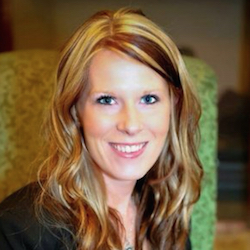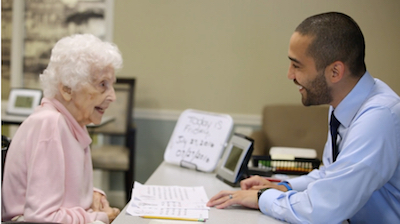
Watching Dan Diaz sit across the table from Dorothy, a soft-spoken woman in her 80s, you’re not sure what to expect.
Dan’s not a typical volunteer. He works in information technology at Covenant Retirement Communities’ corporate office in Skokie, IL, and spends his day problem-solving computer issues and streamlining business operations. Caring for residents with dementia isn’t in his job description.
But on this day, he has traveled 30 minutes north to Covenant Village of Northbrook, one of 15 retirement communities operated nationwide by CRC. He is here to volunteer for a program he believes will make life better for Dorothy, who has dementia.
“Hello, Dorothy,” he begins. Right away, Dorothy tells Dan he reminds her of her grandson. Dan beams, and the SAIDO Learning session begins.
What is SAIDO
SAIDO is the newest component of CRC’s LifeConnect Wellness Program, and it’s proving to be an effective option for treating the symptoms of Alzheimer’s and dementia. There is no cure for Alzheimer’s, but studies show that SAIDO can improve or lessen the symptoms of the disease, allowing people to participate more in their days and engage with family members and caregivers.
The program also is inspiring CRC employees to rethink their roles in making a difference in the lives of residents.
SAIDO is offered at CRC’s 12 continuing care retirement communities and supported by staff members like Dan, called SAIDO “supporters.” He is one of more than 100 CRC employees from every department — administration, housekeeping, maintenance, dining, sales, accounting, human resources — who voluntarily take time out of their work days to train for and lead SAIDO sessions.
How SAIDO works
SAIDO Learning is a drug-free, cognitive therapy that uses simple math, reading aloud, writing and number boards to stimulate the pre-frontal cortex of the brain, the area responsible for cognitive function, social behavior and expression, and decision-making. For 30 minutes a day, five days a week, a SAIDO supporter works with one to two residents, who are called “learners.”
Inspired by small successes
Since implementing SAIDO in 2013, we observe residents smiling more and experiencing more moments of clarity. Some residents experience less agitation and more focus. They’re able to participate in life’s choices again, such as what to eat for lunch or which blouse to wear. These small but impactful improvements make life more fulfilling and joyful for residents and their families.
For staff members to witness this transformation and know that they had a hand in making another person’s life better is life-changing. It’s a powerful incentive that brings even more value and compassion to how we approach dementia care.
A community of caregivers
Interacting with people who have dementia can be intimidating for those not familiar with the symptoms and behaviors associated with the disease. As more staff members are introduced to SAIDO, we continue to see a greater understanding of dementia and dementia care overall.
SAIDO teaches the power of observation, the art of redirecting and the power of positive affirmation. The days of employees reporting behaviors to a nurse are fading because staff members are equipped with the knowledge and understanding to step in and help in the moment.
 Over time, staff members develop relationships and form familiar connections with residents. Dan (pictured in the accompanying photo) expressed how working as a SAIDO supporter gave him a perspective he never would have achieved in his daily work.
Over time, staff members develop relationships and form familiar connections with residents. Dan (pictured in the accompanying photo) expressed how working as a SAIDO supporter gave him a perspective he never would have achieved in his daily work.
“It’s given me an appreciation of life and an understanding of what it feels like to be trapped in my own mind,” he said. “I feel proud when I see my learners improving.”
Ryan Hust, a SAIDO supporter and associate executive director at The Holmstad in Batavia, IL, welcomes the break from his administrative responsibilities so he can spend time with residents.
“SAIDO is a weekly reminder of why I do what I do,” he said. “It is so gratifying to see SAIDO working and to be part of that experience.”
Creating hope
Hope isn’t a word often used in the same sentence as Alzheimer’s. There’s no cure, there’s no formula for prevention, and just last year Eli Lilly announced its experimental Alzheimer’s drug failed in a clinical trial. Even so, there’s a sense of hope among our staff and leadership team members. People are energized by the results they’re seeing with SAIDO, and they want to be part of it.
We asked Dan why, as an IT support manager, he’s a SAIDO supporter, and he answered: “This world was once theirs. It’s my job to bring them one step at a time back onto the path of life.”
One step at a time, with SAIDO we’re breaking down silos and building an even stronger sense of community. We’re making life better and bringing joy to our residents and families.
Watch a video of SAIDO in action here:
Jillian Thomas is director of assisted living operations and oversees SAIDO Learning at Covenant Retirement Communities, the nation’s sixth largest not-for-profit senior services provider. For more information on SAIDO Learning, visit www.covenantretirement.saidolearning.com or call (877) 591-0427. SAIDO Learning is the result of the collaboration between Dr. Ryuta Kawashima of Tohoku University in Sendai, Japan; the Kumon Institute of Education in Osaka, Japan; and Eliza Jennings, a senior living provider in Cleveland.
McKnight’s Senior Living welcomes guest columns on subjects of value to the industry. Please see our submission guidelines for more information.




